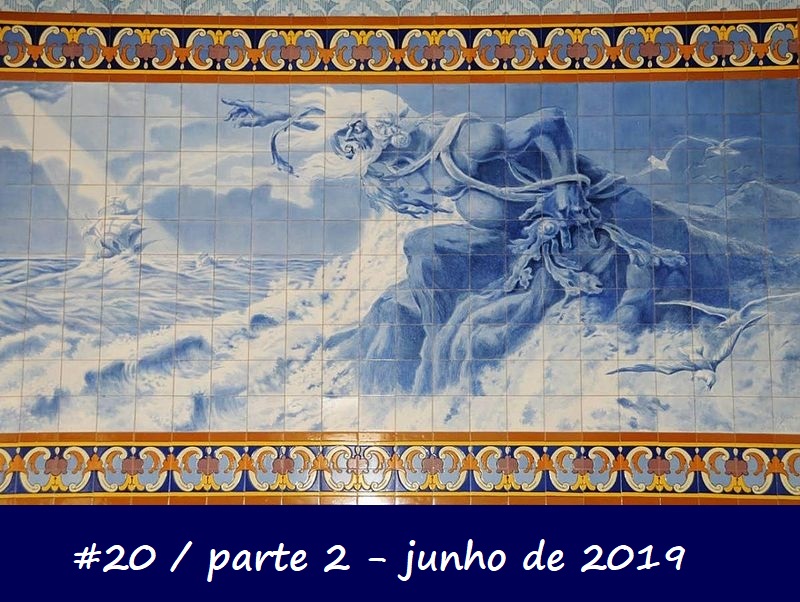Memorial do convento: the historical novel meets the greek tragedy
DOI:
https://doi.org/10.11606/issn.2175-3180.v11i20p251-268Keywords:
José Saramago, Memorial do convento, TragedyAbstract
This article is based on the hypothesis that José Saramago's historical novel, Memorial do convento, published in 1982, displays some traits of the Greek tragedy that contribute to the development of paths to a new comprehension of historical novel, expanding the reader's perception of the genre, through reflections elicited by the literary references implied in the novel. From this perspective, and with the aim of bringing the concepts of Greek tragedy closer to the historical novel composed by Saramago, we are going to look into the concepts developed by the Austrian historian Albin Lesky (2003), who in his work The Greek tragedy perceives the tragic as a philosophical principle that reveals a specific outlook on the world. Supporting the reflections proposed here, we also mention some arguments of the French historian Jean-Pierre Vernant (2006), those which, intertwined with Alcmeno Bastos’s (2007) perception of historical novel and Benedito Nunes’s (2003) perception of romanticism, concur with the arguments of Terry Eagleton (2013). In Brazil, Teresa Cristina Cerdeira da Silva (2018), one of the greatest researchers of Saramago's work, is another reference to our analysis, since some of her studies suggest a thought-provoking approximation between Memorial do convento and certain aspects of tragedy.
Downloads
References
BASTOS, Alcmeno. Introdução ao romance histórico. Rio de Janeiro: EdUERJ, 2007.
BETHENCOURT, Francisco. História das inquisições: Portugal, Espanha e Itália. São Paulo: Companhia das Letras, 2000.
CERDEIRA, Teresa Cristina. José Saramago entre a história e a ficção. Belo Horizonte: Moinhos, 2018.
CERDEIRA, Teresa Cristina. O avesso do bordado. Lisboa: Editorial Caminho, 2000.
CINTRA, Rodrigo Suzuki. Shakespeare e Maquiavel. São Paulo: Alameda, 2015.
EAGLETON, Terry. Doce violência: a ideia do trágico. São Paulo: Unesp, 2013.
EURÍPEDES et al. O melhor do teatro grego. Tradução de Mário da Gama Kury. Rio de Janeiro: Zahar, 2013.
FILHO, Linhares. “Uma leitura de Memorial do convento”. In: BERRINI, Beatriz (Org.) José Saramago: uma homenagem. São Paulo: EDUC, 1999.
JAEGER, Werner. Paidéia. São Paulo: Martins Fontes, 1989.
KURY, Mário da Gama. Dicionário de mitologia grega e romana. Rio de Janeiro: Jorge Zahar, 2008.
LESKY, Albin. A tragédia grega. São Paulo: Editora Perspectiva, 2003.
MARINHO, Maria de Fátima. O romance histórico em Portugal. Porto: Campo das Letras, 1999.
NUNES, Benedito. “A visão romântica” In: GUINSBURG, J. (Org.) O romantismo. São Paulo: Perspectiva, 2013.
SANTOS, Rosemary Conceição dos. Saramago: metáfora e alegoria no convento. São Paulo: Scortecci, 2004.
SARAMAGO, José. Memorial do convento. São Paulo: Companhia das Letras, 2013.
VERNANT, Jean-Pierre. Mito e religião na Grécia antiga. São Paulo: WMF Martins Fontes, 2006.
VERNANT, Jean-Pierre; VIDAL-NAQUET, Pierre. Mito e tragédia na Grécia antiga. São Paulo: Perspectiva, 2011.
Downloads
Published
Issue
Section
License
Copyright (c) 2019 Filipe Nassar Larêdo

This work is licensed under a Creative Commons Attribution-NonCommercial 4.0 International License.
O(s) autor(es) declara(m) automaticamente ao enviar um texto para publicação na revista Desassossego que o trabalho é de sua(s) autoria(s), assumindo total responsabilidade perante a lei nº 9.610, de 19 de fevereiro de 1998, no caso de plágio ou difamação, obrigando-se a responder pela originalidade do trabalho, inclusive por citações, transcrições, uso de nomes de pessoas e lugares, referências histórias e bibliográficas e tudo o mais que tiver sido incorporado ao seu texto, eximindo, desde já a equipe da Revista, bem como os organismos editoriais a ela vinculados de quaisquer prejuízos ou danos.
O(s) autor(s) permanece(m) sendo o(s) detentor(es) dos direitos autorais de seu(s) texto(s), mas autoriza(m) a equipe da Revista Desassossego a revisar, editar e publicar o texto, podendo esta sugerir alterações sempre que necessário.
O autor(s) declara(m) que sobre o seu texto não recai ônus de qualquer espécie, assim como a inexistência de contratos editoriais vigentes que impeçam sua publicação na Revista Desassossego, responsabilizando-se por reivindicações futuras e eventuais perdas e danos. Os originais enviados devem ser inéditos e não devem ser submetidos à outra(s) revista(s) durante o processo de avaliação.
Em casos de coautoria com respectivos orientadores e outros, faz-se necessária uma declaração do coautor autorizando a publicação do texto.
Entende-se, portanto, com o ato de submissão de qualquer material à Revista Desassossego, a plena concordância com estes termos e com as Normas para elaboração e submissão de trabalhos. O não cumprimento desses itens ou o não enquadramento às normas editoriais resultará na recusa do material.


